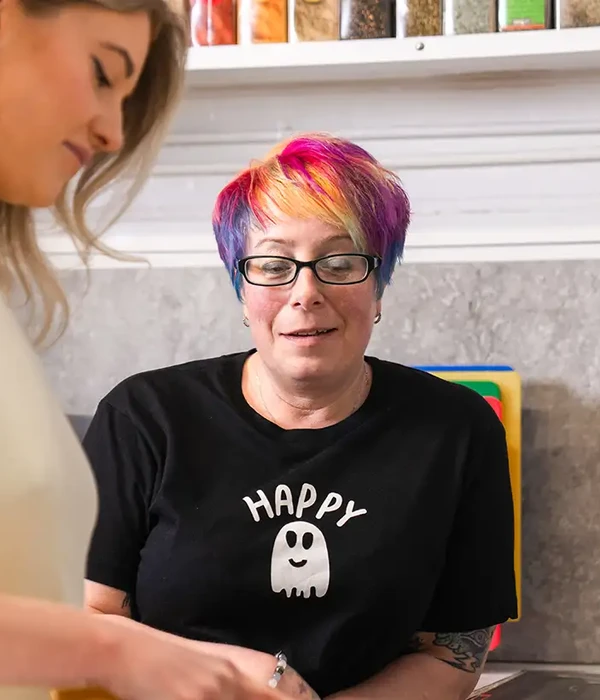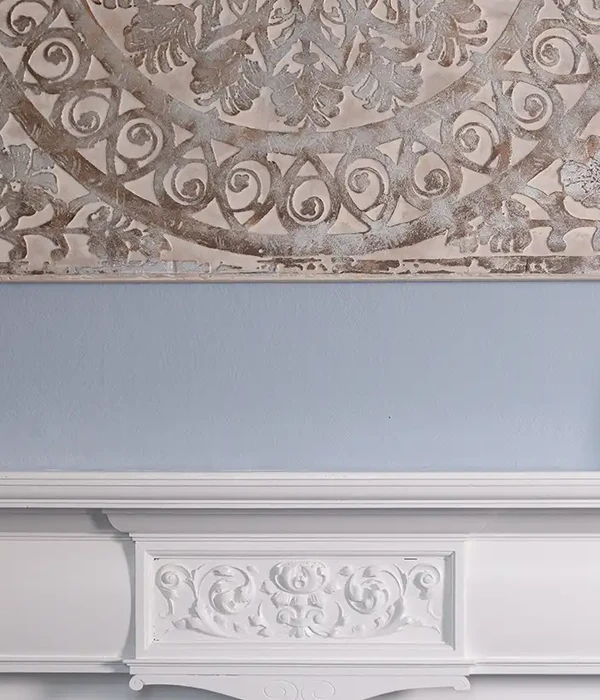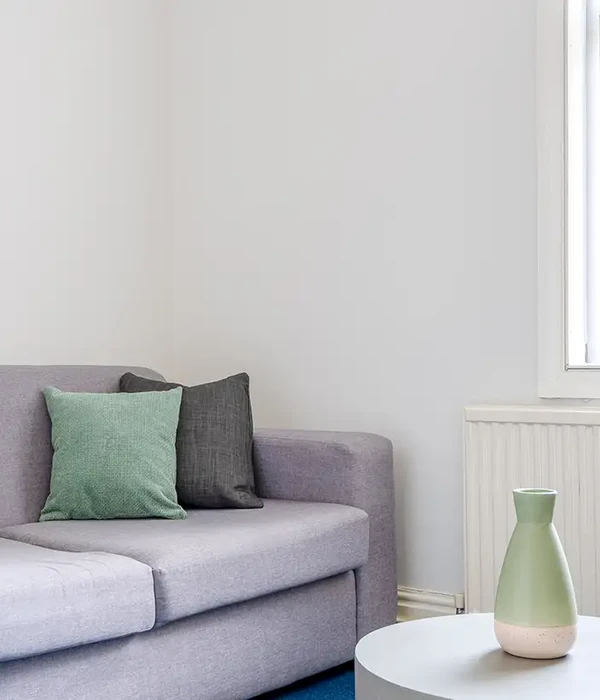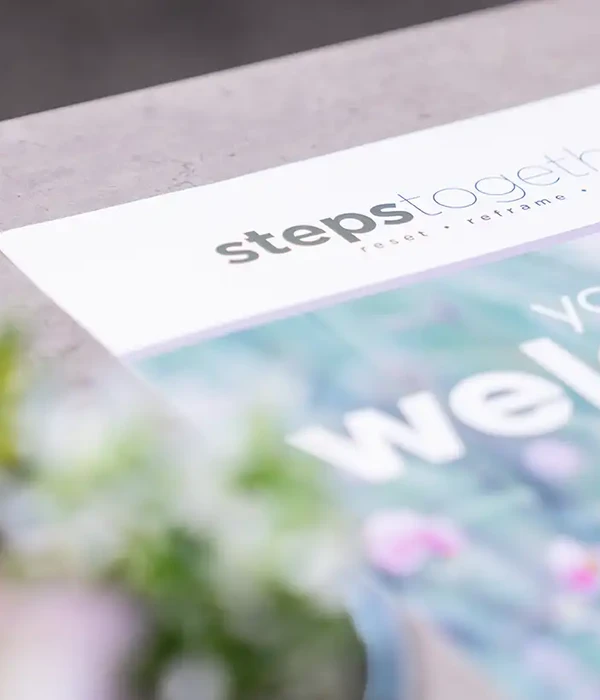Pornography Addiction Treatment
Struggling with pornography addiction can feel overwhelming, but it can be treated. Pornography addiction treatment gives you the tools, support, and understanding needed to regain control of your habits and improve your quality of life.
Much like substance abuse, people affected by porn addiction find that when porn use starts to impact their daily routine or relationships, reaching out for love and relationships treatment can make a real difference.

Take the First Step Towards Recovery
Steps Together offers personalised support and proven treatments, providing the care, guidance and encouragement you need to move forward with confidence and build a healthier future.

Understanding Pornography Addiction
Porn addiction is recognised by health professionals, but there are still many misunderstandings about what it is and how it affects people. It involves patterns of behaviour that impact mental health, relationships, and day-to-day functioning.
Unlike alcohol and drug addictions, excessive porn consumption is not officially listed in the Diagnostic and Statistical Manual for Mental Disorders (DSM-5). However, many mental health professionals treat it similarly to conditions such as internet addiction or compulsive gambling.
Causes and Risk Factors
Easy accessibility to internet pornographic content, stress, anxiety, or past trauma can all increase your risk. Some people may turn to the use of pornography as a way to manage unpleasant emotions or to escape from problems in life. Genetics and brain chemistry might also play a part.
Social isolation and an unsatisfying sex life can create an environment where the risk of developing a porn addiction is high, leading to patterns of use that are difficult to break. Co-occurring mental health disorders make it challenging to stop watching pornography.


Prevalence and Accessibility
With the rise of online pornography and easy internet access, the rates of reported compulsive sexual behaviour and addiction may be increasing. People of any age or background can be affected, but younger and more technologically engaged individuals may be at greater risk.
Recent years have seen sharp growth in both the variety and accessibility of online pornography. You can access content from nearly any device at any time, making it easier for habits to develop unchecked. This behaviour is addictive, and it can lead to serious impacts on mental health and relationships.
Porn Addiction Treatment Options
Different forms of therapy can be used in a pornography addiction treatment plan to help you understand your triggers, develop healthier coping skills, and address any underlying mental health issues. Professional porn addiction rehab can include:
Cognitive Behavioural Therapy (CBT)
CBT focuses on identifying and changing patterns of thinking and behaviour that lead to problematic pornography use. You work with a therapist to spot triggers, automatic thoughts, and reactions.
Through regular sessions, you learn new coping strategies to handle stress, boredom, or difficult emotions without turning to pornography. CBT is structured and goal-oriented and is widely used in addiction recovery.
Addiction Counselling and Accountability
Addiction counselling gives you a chance to work closely with a professional in a one-to-one or group setting. Counsellors focus on understanding what triggers your porn use and help you plan ways to avoid relapse. Sessions can address both addiction and any underlying mental health issues.
Accountability is an important part of treatment. You might set up regular check-ins with your counsellor or a trusted member of your support group. Keeping someone updated about your progress can help you stay committed.
Dialectical Behaviour Therapy (DBT)
Dialectical Behaviour Therapy helps treat pornography addiction by teaching you how to manage overwhelming emotions without turning to compulsive behaviour. Through emotional regulation, distress tolerance, and mindfulness, DBT builds your ability to handle urges in the moment while staying grounded.
It also enhances your ability to relate to others, which helps repair relationships affected by the condition. Over time, these skills create lasting change by replacing unhealthy habits with more mindful and adaptive coping strategies.
Group Therapy Programmes
Group therapy programmes provide professional help within a structured setting. Sessions are led by mental health professionals who guide multiple participants simultaneously. Group members can share their experiences and learn from others about how they cope with urges.
Weekly meetings allow you to learn new coping skills while seeing that your struggles are not unique to you. Professionals may teach skills in self-control, stress management, and relationship building.
Other behavioural addictions we treat at our rehab centre
Gambling Addiction Treatment
Gambling Addiction Treatment

Support Groups for Pornography Addiction
Support groups offer a safe and judgment-free space to talk about the challenges of pornography addiction. Regular meetings give members the chance to share experiences, discuss setbacks, and celebrate progress together.
Both in-person and online groups are available, making support more accessible. Online communities can be especially helpful for those who value anonymity or who don’t have local options nearby.
One of the biggest benefits of support groups is reducing shame and isolation. Hearing from others who face similar struggles helps you feel less alone and normalises the recovery journey.
Mutual encouragement also plays a powerful role. When members hold each other accountable, it becomes easier to stay motivated, develop healthier habits, and build a long-term support system.

Overcoming Barriers to Treatment
Accessing treatment for pornography addiction is not always easy or affordable. Some mental health treatment services charge high fees, especially private therapy or inpatient programmes, which many people cannot cover out of pocket. Health insurance often does not include such care, leaving many people with limited options in seeking professional help.
Distance is a concern if you live in a rural area, as specialised clinics for porn or sex addiction may only exist in bigger cities. This makes it harder to attend regular sessions or join support groups in person. However, online counselling has become more common, offering more flexible porn addiction recovery.
One of the greatest hurdles to getting help for addiction to porn is the fear of judgment or embarrassment. Shame and social stigma can make it tough to talk about pornography use, especially with professionals or in group settings. To assuage these concerns, rehab centres strongly protect the privacy of their patients.
Impact on Mental Health and Relationships
Much like drug and alcohol addiction, pornography addiction can affect your day-to-day mood, how you see yourself, and the quality of your relationships. It often extends beyond simple embarrassment and can lead to ongoing stress and strain in various aspects of your life.
Mental Health Disorders Associated with Pornography Addiction
Frequently viewing pornography has been linked to higher rates of anxiety, depression, and emotional distress. Studies have found that people who struggle with compulsive use are more likely to report feeling sad, stressed, or even hopeless. This is not just about feeling guilty; these symptoms can significantly impact your ability to function effectively at work or school.
High levels of pornography consumption may affect dopamine levels in ways similar to other behavioural addictions, making it hard to stop. Some research indicates that this problem can bring on feelings of shame and increase levels of anxiety, especially if you believe your use is out of control or goes against personal values.
Self-Esteem and Emotional Wellbeing
Compulsive pornography use can weaken your self-esteem and make you feel worse about yourself. Many people report feeling ashamed or unhappy with their behaviour, especially if it goes against personal or cultural values. These feelings often increase emotional problems, such as loneliness and a sense of not being good enough.
Over time, this can lead to the avoidance of social events or a distancing from friends and family. Low self-esteem can also be a barrier to seeking help, as it may cause embarrassment or fear of judgment. Taking steps to address pornography addiction in a supportive setting is important for improving well-being and building confidence.
Relationship and Family Dynamics
Pornography addiction can harm trust and satisfaction in romantic relationships. When someone secretly uses pornography a lot, it may lead to secrecy, arguments, and disappointment between partners. Unrealistic expectations from pornography often lead to confusion about intimacy and can fuel dissatisfaction in real-life sexual relationships.
Family life can also be affected, especially if the addiction leads to withdrawal symptoms and less time spent with loved ones. Couples or family therapy may help address misunderstandings and encourage open conversations. Addressing addiction in a supportive setting with family or partners can create healthier boundaries and help rebuild trust.

Find Treatment for Porn Addiction
Porn is widely consumed, but some people can develop an addiction to pornography, and it can control their lives. As viewing porn is generally done alone, it can be hard to tell when it becomes excessive.
Dealing with pornography addiction often requires a mix of behavioural therapies, practical strategies, and lifestyle changes. At Steps Together, we offer professional pornography addiction treatment to help you stop watching porn. Reach out to us today to learn more about behavioural health treatments.
Frequently Asked Questions
What are effective methods for overcoming compulsive sexual behaviour?
Cognitive behavioural therapy, also called CBT, is often used to address compulsive sexual behaviour. It helps you change your thinking patterns and reactions. Setting healthy boundaries, adopting new routines, and self-monitoring your behaviour can support your progress. Engaging in healthier activities and hobbies may also be beneficial.
Are there any support groups for individuals struggling with excessive pornography use?
Support groups are available for those seeking help with pornography use. Some options include in-person meetings and online forums. These groups offer understanding, accountability, and shared experiences. Programmes like Porn Addicts Anonymous (SAA) provide a structured approach through peer support.
How can implementing lifestyle changes contribute to recovery from sexual compulsiveness?
Positive lifestyle changes, such as regular exercise, maintaining a structured daily routine, and limiting screen time, can reduce triggers. Engaging in social activities may also help fill time and lessen temptation. Making your environment less accessible to triggering material plays a key role. Healthy sleep habits and stress management are also beneficial.
Can therapy assist in dealing with an addiction to adult content?
Therapy can be a helpful tool for addressing addiction. A professional counsellor or therapist can guide you in understanding triggers and building coping skills. You may also benefit from therapy sessions focused on managing urges, navigating relationships, and developing long-term plans for healthy behaviours.
What role does willpower play in breaking the cycle of pornography dependence?
Willpower is important, but can be unreliable if relied upon alone. Sustained change is often more successful when you combine determination with pornography addiction treatment. Structured routines, external accountability, and guidance from professionals can strengthen your efforts beyond simply resisting urges.
What are the potential psychological impacts of long-term consumption of pornographic material?
Long-term use may affect your mental health, relationships, and self-esteem. These impacts can include increased anxiety, mood changes, and unrealistic views of intimacy. You may also experience difficulties in personal relationships and at work.





